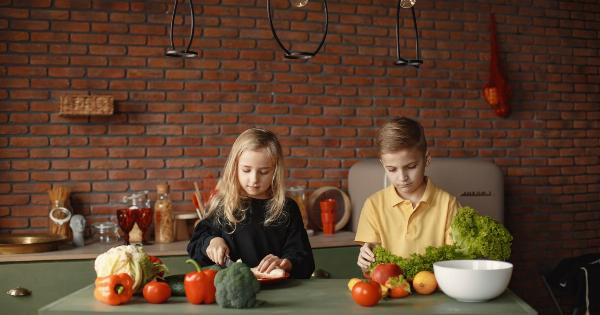More and more people are choosing to adopt a meat-free diet for a variety of reasons, such as concerns about animal welfare, sustainability, and health.
However, when it comes to children, some parents may wonder if a vegetarian or vegan diet is safe and appropriate for their growing bodies and developing minds. In this article, we will explore the pros and cons of a meat-free diet for children and provide evidence-based information to help parents make informed decisions.
Nutritional Considerations
One of the main concerns about a meat-free diet for children is whether it can provide all the nutrients they need to grow and thrive.
While it is certainly possible to meet all of a child’s nutritional needs on a vegetarian or vegan diet, it does require careful planning and attention to detail.
Protein
Protein is essential for growth and repair of tissues, and children need more protein per pound of body weight than adults. However, there are plenty of plant-based sources of protein, such as beans, lentils, tofu, tempeh, nuts, seeds, and whole grains.
Soy products, in particular, are a great source of complete protein that contains all the essential amino acids. However, it is important for children to eat a variety of protein sources to ensure they are getting all the necessary amino acids.
Iron
Iron is crucial for carrying oxygen throughout the body, and children need more iron than adults due to their rapid growth and high activity levels. While red meat is a rich source of iron, there are plant-based sources as well.
These include beans, lentils, spinach, tofu, fortified breakfast cereals, and dried fruits like raisins and apricots. However, it is important to note that the iron in plant foods (known as non-heme iron) is not as easily absorbed by the body as the iron in animal products (heme iron).
To enhance absorption of non-heme iron, it can be paired with vitamin C-rich foods like citrus fruits or peppers.
Calcium
Calcium is essential for building strong bones and teeth, and children need plenty of it to support their growing bodies. While dairy products are a common source of calcium, there are many plant-based options as well.
These include fortified plant milks, tofu made with calcium sulfate, leafy greens like kale and collard greens, and calcium-fortified orange juice. However, it is important to ensure that children are getting enough calcium through their diet or through supplements.
Vitamin D
Vitamin D is crucial for bone health, as it helps the body absorb calcium. While milk and other dairy products are fortified with vitamin D, there are few natural food sources of this vitamin.
The main source of vitamin D is sunlight, but this can be difficult to obtain in some regions or during the winter months. Therefore, it is important for children to get enough vitamin D through their diet or through supplements.
Vitamin B12
Vitamin B12 is necessary for healthy nerve cells and red blood cells. It is primarily found in animal products such as meat, fish, eggs, and dairy. Therefore, it can be challenging for vegetarians and vegans to get enough B12 through their diet alone.
However, there are fortified plant milks and breakfast cereals, as well as B12 supplements, that can provide adequate levels of this vitamin.
Potential Benefits
While there are some nutritional considerations to keep in mind when considering a meat-free diet for children, there are also potential benefits to this lifestyle.
Health Benefits
A vegetarian or vegan diet can be rich in nutrients and low in saturated and trans fats, which can reduce the risk of obesity, heart disease, and some types of cancer.
Plant-based diets have also been shown to help manage and prevent type 2 diabetes, as well as improve gut health and immune function.
Ethical and Environmental Benefits
Many people choose a meat-free diet for ethical and environmental reasons, such as reducing animal cruelty, avoiding the environmental impact of animal agriculture, and promoting sustainability.
Children who are raised on a plant-based diet may develop a stronger appreciation for the importance of animal welfare and environmental sustainability.
Potential Risks
In addition to the nutritional considerations, there are some potential risks associated with a meat-free diet for children.
Protein and Nutrient Deficiencies
If a vegetarian or vegan diet is poorly planned, children may not get enough protein or essential nutrients. This can lead to stunted growth, delayed development, and other health problems.
Therefore, it is important for parents to ensure that their child’s diet is well-rounded and nutritionally adequate.
Eating Disorders
Children who follow a vegetarian or vegan diet may be at increased risk for developing eating disorders, particularly if they are highly restrictive or if they use the diet as a way to control their weight or body image.
Therefore, it is important to monitor children’s eating habits and make sure they are getting enough calories and nutrients.
Social Isolation
Children who follow a plant-based diet may feel left out or isolated in social situations, particularly if they attend parties or other events where meat and animal products are the norm.
Parents can help by providing alternative options or by talking to other parents beforehand about dietary restrictions.
Conclusion
In summary, a vegetarian or vegan diet can be safe and healthy for children, but it requires careful planning and attention to nutritional needs.
Parents should consult with a pediatrician or registered dietitian to ensure that their child is getting all the necessary nutrients for growth and development. While a meat-free diet can offer many potential benefits, parents should also be aware of the potential risks, such as nutrient deficiencies, eating disorders, and social isolation.
Ultimately, it is up to parents to make informed decisions about their child’s diet and to provide the support and guidance they need to follow a healthy and sustainable lifestyle.































